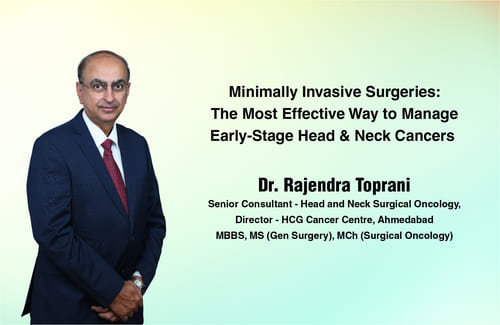
27 Apr, 2022

27 Apr, 2022
Until a few years ago, patients with head and neck cancer had fewer treatment options. The conventional surgery, which involves cancer removal through a large incision, resulted in longer hospital stays, breathing and swallowing difficulties, lengthy recovery, increased risk of infections and other treatment-related complications, etc.
Minimally-invasive surgeries, on the other hand, come with fewer side effects as compared to traditional open surgery. These surgeries are either performed using an endoscopic laser device or a robotic surgery system.
Over years, HCG has built a team of the best oncologists in Ahmedabad, which excels at treating and managing complex cases of head and neck cancers using novel treatment approaches.
Not many know that head and neck cancers can be managed through minimally-invasive surgeries. Before understanding how minimally-invasive surgeries work for head and neck cancers, it is important to know what a minimally-invasive surgery is.
Minimally-invasive surgery refers to surgical procedures wherein the surgeon will be using various approaches to limit the number and size of incisions or cuts that are required to operate on the tumour or there may not be any incision at all.
During traditional open surgery, the surgeon makes one large incision to approach the region that he/she is operating on. However, during minimally-invasive surgery, the surgeon will use smaller endoscopic tools, a light source and a camera that will either be inserted through smaller incisions or natural orifices. This way, the surgeon is able to perform surgeries without incisions.
Follow-up care after minimally-invasive surgeries is similar to the follow-up care that follows traditional surgeries. Nevertheless, in the case of minimally-invasive surgeries, the incidence of treatment-related complications is relatively lower, and the patients show faster recovery.
This approach has revolutionised the management of early-stage head and neck cancers. Of the many minimally-invasive approaches available, endoscopic laser surgery is found to be the game-changer. Trans-oral robotic surgery is another form of minimally-invasive surgery that is recommended for early-stage oropharyngeal cancers. Both these approaches help in preserving the functions of the organ affected and have a positive impact on the overall quality of life.
In a few cases, these procedures can eliminate the need for radiation therapy, which is associated with short-term and long-term side effects.
Endoscopic laser surgery is a minimally-invasive surgical approach wherein surgical lasers are used to excise the tumour precisely. Laser surgery can reduce the risk of bleeding and lymphatic metastases post-operative oedema ensuring early recovery.
In most cases, this is a daycare procedure. An endoscope is inserted into the larynx through the oral cavity. The laser is then aimed at specific lesions through the micromanipulator and lesions on the vocal cords are resected with precision.
Trans-oral Robotic Surgery is a form of robotic surgery that allows surgeons to operate on tumours present in the hard-to-reach areas, especially in the back of the throat and base of the tongue or tonsil. This surgical set-up consists of robotic arms that carry the surgical tools, a special 3D camera for the surgeon to get an enhanced view of the target area and a computer console from where the surgeon will be controlling the robotic arms.
Trans-oral robotic surgeries are usually recommended for early oropharyngeal cancers, cancers of the base of the tongue and tonsils, etc.
Trans-oral robotic surgery for head and neck cancers come with numerous advantages, such as enhanced precision and safety, reduced pain and blood loss and faster recovery after the treatment. However, the biggest advantage of TORS is zero scarring, since there is no tracheotomy involved with minimal need for a feeding tube.
Before the advent of minimally-invasive surgeries, patients with head and neck cancers had to undergo 10- to 12-hour open surgery with an incision reaching from the lip to the throat for proper accessibility and exposure. Depending on the patient, hospital stays ranged from 7 to 15 days, and recuperation took weeks. However, with minimally-invasive surgeries, that need not be the case.
These surgeries come with multiple advantages for early-stage head and neck cancer patients:
Minimally-invasive surgeries are especially helpful in the cases of early-stage head and neck cancers. As the stage advances, cancers will need more comprehensive and multimodal treatment plans, and it is for this reason that early detection becomes important in the management of head and neck cancers.
Opting for regular oral screening and being mindful of a few symptoms like persistent ulcers, white and red patches in the mouth, lumps in the neck region, etc., can support early diagnosis and early treatment through minimally-invasive surgeries. These minimally-invasive surgeries also play a pivotal role in helping patients get back to their normal lives at a faster rate.
Not all head and neck cancers need a multimodal approach. A few head and neck cancer cases can be successfully managed with minimally-invasive surgeries alone – provided they are diagnosed in early stages.
Making informed health decisions is the key to the successful treatment of any health condition. Unfortunately, not many head and neck cancer patients know about minimally-invasive surgeries. In many cases, patients are not able to harness the benefits of these surgeries as they present themselves in the advanced stages. Therefore, it is important for health professionals to educate patients on the importance of screening and the advanced approaches available, while also creating awareness on disease prevention amongst the community.
At HCG Cancer Centre, we have a team of the best oncologists in Ahmedabad, who focus on delivering value-based medicine and treating every cancer case the right way, the first time.
This article is contributed by Dr. Rajendra Toprani, Senior Consultant – Head & Neck Surgical Oncology, Director - HCG Cancer Centre, Ahmedabad